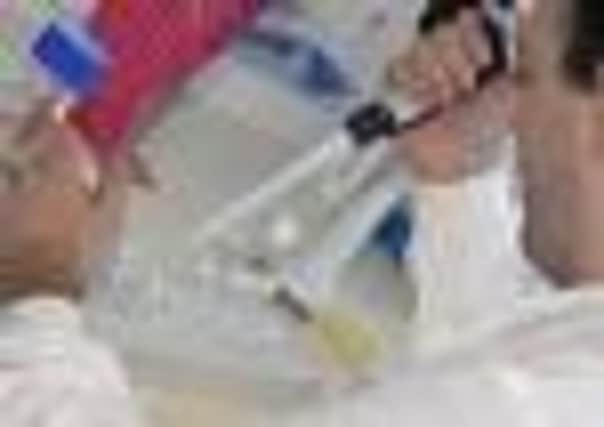Syntopix boosted by green chemical find


The Bradford-based group has just completed a pioneering research project to help scientists creating new environmentally-friendly cosmetic, pharmaceutical and personal care products.
Syntopix researches, develops and tests ingredients for acne treatments, dental products, deodorants and anti-dandruff shampoos.
Advertisement
Hide AdAdvertisement
Hide AdThe company, listed on the Alternative Investment Market, was one of just two successful applicants to win backing for the 30-day project from support organisation Intelligent Formulation.
The study worked with international chemical experts to create novel surfactants. Used to create emulsions and microemulsions, surfactants help water and oily ingredients bind together and are found in many household goods.
The project focused on surfactants that meet the growing consumer demand for cosmetics and healthcare products which use natural and biodegradable products.
Syntopix said the study successfully measured the “characteristic curvature” (CC) of a range of green chemicals – data which gives valuable clues as to how useful the surfactants will be in forming microemulsions. It believes this data could save time and money in the development of new formulations.
Advertisement
Hide AdAdvertisement
Hide AdMicroemulsions are a mixture of oil and water, but unlike ordinary emulsions, contain very small particles. They are found in foods, cosmetics and medicines as well as inks, lubricants and cleaning fluids.
“The work Syntopix has done to characterise surfactants is a benefit not only to the group but also to the wider scientific community,” said Dr Steve Jones, chief executive of Syntopix.
“The project will help define the parameters for successful formulations and we hope that it will encourage surfactant suppliers to measure and provide CC values to aid their customers in formulation design.”
Syntopix will make the CC data public, which it hopes will help with the development of new cosmetic, pharmaceutical and personal care products.
Advertisement
Hide AdAdvertisement
Hide AdDr Jones added: “From our own perspective, we now have new chemical information on two environmentally-friendly surfactants that we can incorporate into our own formulations.
“Following our recent acquisition of Leeds Skin, we now also have the capacity to test our formulations in house using our unique human skin model, LabSkin. As consumers demand more natural ingredients in their personal care products, this will give our products a real edge over competitors.”
Last month Syntopix bought a skin testing centre – Leeds Skin Centre for Applied Research – for £900,000, in what it described as a pivotal transaction. The deal means it no longer has to send potential new acne, dandruff, body odour and gingivitis cures to outside laboratories for clinical trials. Wetherby-based Leeds Skin runs an independent commercial testing facility specialising in human skin microbiology and clinical dermatology research.
Leeds Skin will carry on working for its current clients, which include household names such as Boots, L’Oreal, Stiefel, a GlaxoSmithKline company, and PZ Cussons.
Advertisement
Hide AdAdvertisement
Hide AdIntelligent Formulation is a not-for-profit company, based in Huddersfield, helping companies innovate in formulation.
Its chief executive, Dr Jim Bullock, said: “We are delighted with the outcome of the project and also with its successful collaborative format.
“The results will not only benefit Syntopix but also the wider formulation community in other industrial sectors. We are also very pleased with the high level of interest from that community now that we are disseminating the results.”
In March, Syntopix reported six months of increasing revenues but deeper losses.
Advertisement
Hide AdAdvertisement
Hide AdSyntopix said pre-tax losses for the six months to the end of January hit £557,000 from £517,000 a year earlier. Revenues from commercial agreements increased to £161,000 from £104,000.
Syntopix’s library of compounds now stands at more than 3,000, and it is exploring how to commercialise this.
Going skin deep
Syntopix was spun out of the skin research centre at the University of Leeds in 2003.
It was founded by husband and wife team Dr Jon Cove and Dr Anne Eady, two of the leading experts in skin microbiology.
Advertisement
Hide AdAdvertisement
Hide AdTheir academic work focused on the microbiology of skin, antibiotic resistance in skin bacteria and the pathobiology of acne and eczema. It received initial funding of £483,000 from the Wellcome Trust, with further rounds of funding totalling £720,000 from Techtran Group, the Viking Fund and the White Rose Seedcorn Fund.
The group listed on the Alternative Investment Market in March 2006.